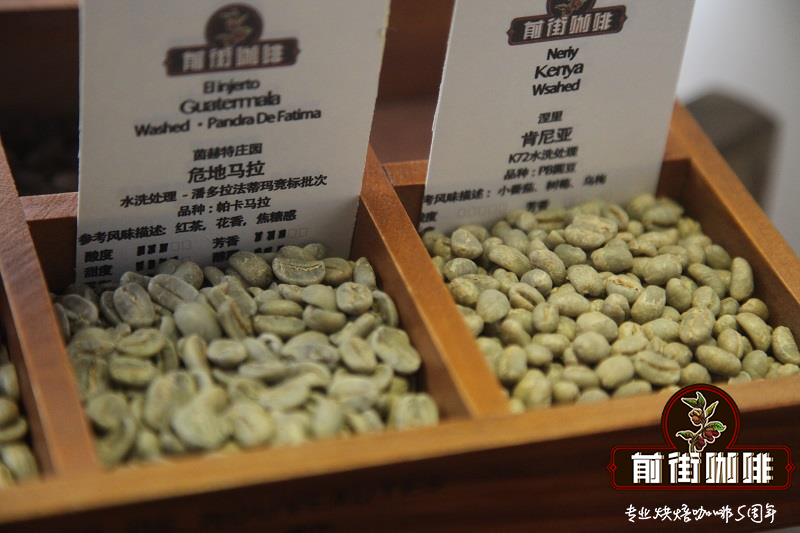The reason why Rwandan coffee can be selected by Starbucks. The significance of coffee to Rwanda

Professional coffee knowledge exchange more coffee bean information please follow the coffee workshop (Wechat official account cafe_style)
What kind of coffee beans can become Starbucks ™coffee beans? It may be due to special geographical conditions, or it may be due to the cooperation of coffee farmers. Rwandan coffee is the representative of the latter, and local women select it carefully from the first step of planting and use organic processing methods to make the flavor of the coffee special. The smell of coffee comes to you, and today I share a story about her:
● Rwanda is bordered by Tanzania to the east, Burundi to the south, Zaire to the west and northwest, and Rwanda to the north. With six volcanoes, 23 lakes and numerous rivers, Rwanda is a landlocked African country with remarkable ecological diversity and beautiful natural scenery. There is the title of "the country of a thousand hills".
● Rwanda is the only country in the world that can fully enjoy the harmony between soil elevation and climate.
Fertile acid volcanic soil,
A high altitude of 1500-2000 meters
Rainfall 9-2200
The suitable cool temperature is 18-22 °.
Coffee farming is a traditional industry in Rwanda. Rwanda is one of the least visited countries in the world, with 90% mainly agriculture and animal husbandry.
In 1904, German missionaries introduced bourbon trees from Guatemala and began to export them in 1917. Through the colonial trade policy, farmers everywhere were required to plant 70 coffee trees, thus creating the history of coffee production in Rwanda.
Unlike other coffee-producing countries, Rwanda still does not have large-scale estates, but coffee is grown by 500000 small-scale farmers.
It is mainly in the form of cooperatives. The planting area is as high as 33000 hectares and there are as many as 80 million coffee trees. In the 1990s, coffee became Rwanda's most important export.
●, however, Rwandan coffee faces many challenges.
The genocide of 1994
Hutu organized genocide against Tutsi and Hutu moderates
A total of 80-1 million people died, accounting for 10 per cent of the country's population.
Most of these people are young men, which is a huge blow to this agricultural and animal husbandry country that is not rich in the first place.
It almost destroyed Lu's coffee industry, and coffee exports plummeted to close to zero.
Imperfect management in the later stage of ● becomes a stumbling block to coffee.
The coffee fruit needs to be transported to the processing plant as soon as possible after picking, but there is a lack of facilities in Rwanda to deal with the fruit in the first place. The fruits are piled up after being picked, which will continue to develop and accelerate mildew and decay due to lack of ventilation. Rotten fruits will affect the quality of coffee and show defective flavor.
In addition, Rwandan coffee can be traced back to water washing plants, which are supplied by cooperatives or small farmers, with an average of 183 coffee trees per small farmer, so it is very difficult for Rwandan coffee to trace coffee back to individual alives. it is difficult to ensure consistent coffee quality.
● potato effect
This effect occurs only in coffee from Rwanda and Burundi. When the coffee fruit is infected by an unknown bacteria, and the bacteria enter the coffee peel, it will have a bad effect, which is harmless to people's health, but when the infected coffee beans are roasted and ground, they will release some undue pungent odors. It smells like a peeled potato. The bacteria only affect certain coffee beans, so as long as they are picked out from a whole bag of coffee beans before grinding, they will not affect other coffee beans.
It is very tricky to eradicate this germ. after the raw beans are processed, it is impossible to identify the infected coffee beans, and it is difficult for coffee roasters to pick them out before roasting, and even after the roasting is finished, the beans are difficult to be found. the defective smell was not detected until it was ground into powder.
The only possibility is to pick the coffee fruit with bacteria before treatment, and the skin of the coffee fruit with bacteria is obviously damaged.
The significance of ● coffee to the people of Rwanda
Coffee has a different meaning for everyone. It may be a sense of ritual, or it may represent the pursuit of quality.
They hope to increase coffee exports to promote the country's economic development, and they also hope that the two major tribes, the Hutu and the Tutsi, who once killed each other, will work together to grow coffee, eliminate gratitude and hatred, and jointly build a better tomorrow.
Coffee places the hope of the people of Rwanda.
Coffee is hope.
Qianjie coffee: Guangzhou bakery, the store is small but a variety of beans, you can find a variety of unknown beans, but also provide online store services. Https://shop104210103.taobao.com
Important Notice :
前街咖啡 FrontStreet Coffee has moved to new addredd:
FrontStreet Coffee Address: 315,Donghua East Road,GuangZhou
Tel:020 38364473
- Prev

What is the aroma and flavor of Rwandan coffee _ how to roast Rwandan coffee beans?
Professional coffee knowledge exchange more information about coffee beans please follow Coffee Workshop (Wechat official account cafe_style) Rwanda: this small East African country should not be ignored by roasters and coffee lovers. It is known as the hometown of thousands of mountains, and its high-quality, high-altitude coffee coexists with its poverty. It is not the largest coffee producer in Africa; in 2016, it only harvested
- Next

Characteristics of Rwanda coffee beans _ how to describe the flavor of Rwanda coffee beans _ price of Rwanda coffee beans
Professional coffee knowledge exchange more coffee bean information please follow coffee workshop (Wechat official account cafe_style) Rwanda is a small mountainous country located in the equator in eastern Africa, covering an area of 26000 square kilometers, more than 10 million of the population depends on coffee exports for more than half of its economy. The genocide in Rwanda in 1994 shocked the world. The film Hotel Rwanda tells the story of this history.
Related
- Detailed explanation of Jadeite planting Land in Panamanian Jadeite Manor introduction to the grading system of Jadeite competitive bidding, Red bid, Green bid and Rose Summer
- Story of Coffee planting in Brenka region of Costa Rica Stonehenge Manor anaerobic heavy honey treatment of flavor mouth
- What's on the barrel of Blue Mountain Coffee beans?
- Can American coffee also pull flowers? How to use hot American style to pull out a good-looking pattern?
- Can you make a cold extract with coffee beans? What is the right proportion for cold-extracted coffee formula?
- Indonesian PWN Gold Mandrine Coffee Origin Features Flavor How to Chong? Mandolin coffee is American.
- A brief introduction to the flavor characteristics of Brazilian yellow bourbon coffee beans
- What is the effect of different water quality on the flavor of cold-extracted coffee? What kind of water is best for brewing coffee?
- Why do you think of Rose Summer whenever you mention Panamanian coffee?
- Introduction to the characteristics of authentic blue mountain coffee bean producing areas? What is the CIB Coffee Authority in Jamaica?

